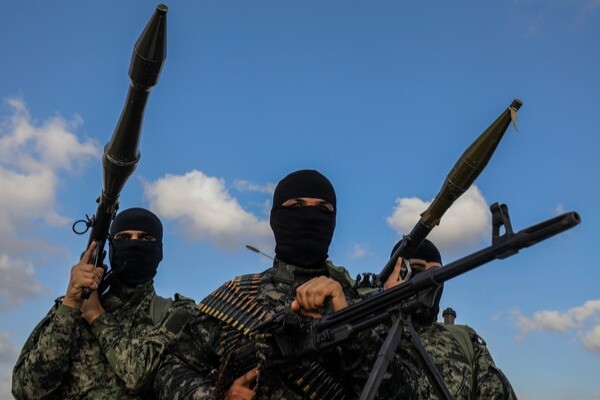By killing Hezbollah’s Fuad Shukr in Beirut and Hamas’s Ismail Haniyeh in Tehran within a 24-hour span, Israel demonstrated a commitment to total victory over its enemies. But the rest of the world, from the least free nations (China) to the freest nations (the U.S.), seems committed to saving Hamas. Jerusalem must resist these efforts.
Chinese support for Hamas is no surprise. In December, the IDF discovered massive caches of Chinese weapons in Gaza. In 2014, the IDF disclosed that an enormous Chinese-made tunneling machine with 40 inch blades was used to dig Hamas’s underground city.
China has been hosting “unity talks” between Hamas and Fatah since April. In June, Foreign Ministry spokesman Wang Webin announced that China supports “all Palestinian factions in achieving reconciliation and increasing solidarity through dialogue and consultation.” On July 23 came the announcement that Chinese diplomacy had culminated in the Beijing Declaration, an agreement to form an “interim national reconciliation government” allowing Hamas and other Palestinian terrorist organizations to survive in the light of day as partners in a government.
By killing Hezbollah’s Fuad Shukr in Beirut and Hamas’s Ismail Haniyeh in Tehran within a 24-hour span, Israel demonstrated a commitment to total victory over its enemies.
The Biden administration’s plan for Hamas’s survival, on the other hand, is more subtle.
Three days after October 7, President Biden gave perhaps the best speech of his presidency (the bar is admittedly low), condemning Hamas and guaranteeing that his administration would provide military assistance to Israel. “The United States has Israel’s back,” he said.
Just one week later, President Biden (or someone using his name) wrote an op-ed in the Washington Post that acknowledged, “as long as Hamas clings to its ideology of destruction, a cease-fire is not peace.” It soberly pointed out that “every cease-fire is time they exploit to rebuild their stockpile of rockets, reposition fighters and restart the killing by attacking innocents again.” However, it also claimed that, “Gaza and the West Bank should be reunited under a single governance structure, ultimately under a revitalized Palestinian Authority, as we all work toward a two-state solution.”
National Security Advisor Jake Sullivan took it a step further on December 14, 2023, when he said that, “Ultimately, governance of the West Bank and Gaza needs to be connected. And it needs to be connected under a revamped and revitalized Palestinian Authority.”
The administration has since backed away from its October recognition that “a cease-fire is not peace,” and in fact has proposed a ceasefire-peace plan that allows for the survival of Hamas by laying the groundwork for a Hamas-infused PA taking over the Gaza strip and potentially a sovereign State of Palestine. David Ignatius of the Washington Post spent most of July anticipating this “cease-fire deal that would halt major fighting in Gaza, release some Israeli hostages and surge humanitarian aid to desperate Palestinian civilians.” He called it “a potential valedictory moment” that would mark “a ringing validation of President Biden’s patient diplomacy.”
In the first State Department briefing after Haniyeh was killed, Vedant Patel, Principal Deputy Spokesman, asserted that the administration was “promoting diplomatic solutions” to the Gaza War. As reporters badgered him about whether Haniyeh’s death made a ceasefire more or less likely, Patel stuck to his script and repeatedly said the State Department was trying to “narrow and close the gaps” between Israel and Hamas in order to “get the deal done.”
If this plan seems familiar, it should. The Oslo Accords allowed Yasser Arafat to pose as a politician while remaining a terrorist as he lied about the “transformation” of the terroristic Fatah and PLO into a peace-seeking Palestinian Authority.
Rebranding the Fatah/PLO opened doors to money and legitimacy, but everyone knew that neither had truly changed. Arafat often spoke about peace in English and jihad against Israel in Arabic. At the height the second Intifada, he wore the PA mantle to disguise his terrorist operations, always slyly insisting that the PA was separate from the Al-Aqsa Martyrs Brigades, Tanzim, Force 17, and the other terrorist organizations he controlled. He gave orders for attacks, including suicide bombings, just as Hamas leaders did, but he did so while pretending to be opposed to terrorism. Most of the world, including Israel, went along with his charade.
As Arafat took over the Palestinian educational system and inculcated future generations into terrorists, Israelis experienced violence worse than anything that came before Oslo. As Kenneth Levin wrote in The Oslo Syndrome, Delusions of a People Under Siege (2005), many Israelis took “refuge in delusions of Israeli culpability, the subtext of which is that the proper self-reforms and concessions by Israel can and would suffice to win peace, despite all evidence to the contrary.”
But Israel seems to have learned from the past and seems committed not to repeat past mistakes, such as trusting “the promises of its friends and not the threats of its enemies,” as Elie Weisel put it.
Among Palestinians, if not the rest of the world, today’s PA is indeed viewed as a moribund organization, limping towards oblivion under an unpopular octogenarian in the 20th year of his four-year presidential term. Gone is the sheen of the Arafat days. Many critics attribute the PA’s tarnished reputation to rampant corruption, but Hamas is just as corrupt. Its leaders are billionaires living far from danger, and its operational commanders steal food and use Gazans as human shields.
The PA’s lost vitality and popularity have been transferred to Hamas because of Hamas’s militancy, its commitment to “resistance,” and its rejection of any kind of cooperation with Israel.
The PA’s lost vitality and popularity have been transferred to Hamas because of Hamas’s militancy, its commitment to “resistance,” and its rejection of any kind of cooperation with Israel. Every poll shows that Hamas enjoys popular support among Palestinians, with majorities in both Gaza and the West Bank approving of the October 7 assault.
The PA understands that it can only regain its lost popularity and credibility among Palestinians by becoming more like Hamas. As the Palestinian Media Watch points out, the PA has been bragging since October 7 that it has more terrorists than Hamas, more prisoners in Israeli jails than Hamas, and that most Palestinian “martyrs” are from Fatah or the PA security forces (i.e., the Palestinian police).
Even though Biden’s latest ceasefire plan doesn’t specifically call for a unified Hamas/Fatah/PLO Palestinian Authority governing a contiguous Palestinian State, that is the goal of the people running his foreign policy and the people they respect.
A unity government is the policy advocated by Thomas Friedman who wants the U.S. and Israel to “rebuild Fatah, merge it with Hamas, [and] elect an Israeli government that can freeze settlements” in the West Bank.”
It is the policy advocated by Jimmy Carter, who fretted after the 2006 Gaza elections that providing aid to the Palestinians would become more difficult and argued that, “there’s a good chance” that Hamas would renounce violence. In 2008, Carter claimed that Hamas had accepted a “Two-State Solution.” In 2015, he said that Hamas leader Khaled Mashal, “Chairman of the Hamas Political Bureau,” was committed to peace while Benjamin Netanyahu, Prime Minister of Israel, was not.
The Biden plan allows Hamas to adopts what Matthew Levitt calls the Hezbollah strategy. Just as Hezbollah participates in the Lebanese government but retains its war-fighting and terrorism capabilities separately, so too “Hamas hopes to exert the same influence and independence with its own movement and militia, neither beholden to nor controlled by a government,” Levitt explains.
The Netanyahu government’s resolve to follow through with the total destruction of Hamas will be tested in the remaining months of the Biden administration.
The Netanyahu government’s resolve to follow through with the total destruction of Hamas will be tested in the remaining months of the Biden administration.
Expect Secretary of State Antony Blinken and National Security Advisor Jake Sullivan, and maybe even Chinese diplomats, to argue that the PA will be a moderating force on Hamas. The opposite is true. And expect the State Department to make distinctions between the militant and political “wings” of Hamas. It is a ruse.
Israel has already rejected the Beijing Declaration, but it has also signaled willingness to go along with the a “revitalized” or “reformed” PA governing Gaza.
The European Union has sent millions of euros to Ramallah since October 7. It will go to great lengths to save the PA but will exercise minimal scrutiny over Hamas’s involvement in a “revitalized” PA, just as it defends and continues to fundthe corrupt UNRWA in spite of Hamas’s involvement.
Any ceasefire agreement that allows Hamas members of any “wing” to participate in either a China-approved interim government or a U.S.-approved “revitalized” PA will lead to more October 7-style assaults.









